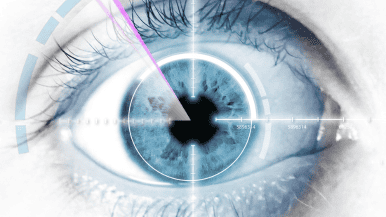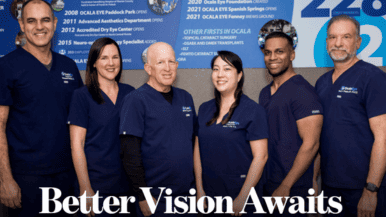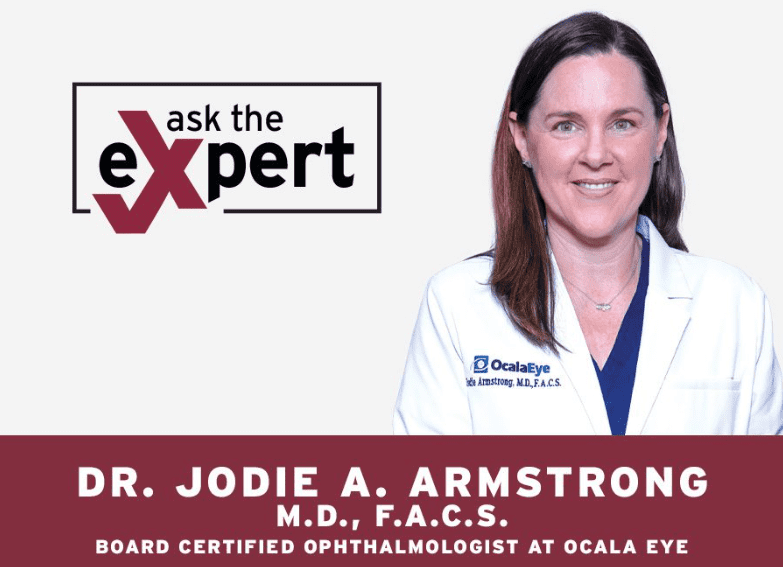- What exactly is a cataract?
- When is cataract surgery necessary?
- Is cataract surgery painful?
- What does the cataract surgery procedure involve?
- How long does it take to recover from cataract surgery?
- Will I need glasses after cataract surgery?
- Are there any risks or complications?
- Can cataracts come back after surgery?

If you or someone you know is over the age of 60 and experiencing vision problems, cataracts may be the culprit. Cataracts can make daily activities challenging and impact your quality of life. The good news is that cataract surgery can help restore clear vision and improve your overall well-being. Here we answer some of the top cataract surgery questions patients often ask. So, let’s dive in!
What exactly is a Cataract?
Imagine looking through a foggy window; that’s how a cataract affects your vision. A cataract is the clouding of the natural lens in your eye, which leads to blurry vision and difficulty reading, driving, or recognizing faces.
When is cataract surgery necessary?
Cataract surgery becomes necessary when the clouding of your lens starts to interfere with your daily activities and quality of life significantly. If you find yourself struggling with simple tasks like reading or driving, it might be time to consider cataract surgery.
Is cataract surgery painful?
The thought of eye surgery can be intimidating, but rest assured, cataract surgery is typically painless. You’ll receive mild medication to relax you, and numbing drops are used to numb the eye, ensuring you won’t feel any pain during the procedure. Some patients may experience mild discomfort or pressure, but nothing unbearable.
What does the cataract surgery procedure involve?
Cataract surgery involves removing the cloudy lens and replacing it with an artificial intraocular lens (IOL). The procedure is an outpatient procedure performed at Ocala Eye’s Surgery Center, meaning you can go home the same day. It’s relatively quick, lasting around 30 minutes or less. Patients can expect to be at the surgery center for 2-3 hours.
How long does it take to recover from cataract surgery?
Recovering from cataract surgery is surprisingly swift. Most individuals can resume their regular activities within a week. However, it’s important to take it easy for a few days, avoid strenuous activities, and follow your surgeon’s post-operative instructions. Your vision may take a few weeks to fully stabilize and improve.
Will I need glasses after cataract surgery?
The need for glasses after cataract surgery depends on various factors. Monofocal IOLs offer clear vision at a single distance, typically for distance vision. You may still require reading glasses for near vision. However, there are multifocal and accommodating IOLs available that can provide clear vision at multiple distances, reducing the need for glasses. Ocala Eye offers different Advanced Lifestyle Lenses to suit your visual and lifestyle needs.
Are there any risks or complications?
As with any surgical procedure, there are some risks involved with cataract surgery. However, serious complications are rare. Potential risks may include infection, bleeding, swelling, retinal detachment, or increased eye pressure. Your eye care professional will explain these risks and take the necessary precautions to minimize them.
Can cataracts come back after surgery?
Once a cataract is removed, it does not come back. However, some individuals may experience a clouding of the lens capsule, the part that holds the artificial lens. This can occur months or years after surgery, but it can be easily treated with a painless laser procedure called YAG capsulotomy.
Cataract surgery is a safe and effective solution for patients experiencing vision problems caused by cataracts. It can significantly improve your quality of life, allowing you to engage in daily activities with clarity and confidence. If you’re considering cataract surgery, consult our experienced cataract surgeons at Ocala Eye, who can address your cataract surgery questions and concerns, explain your options, and guide you through the process. Remember, clear vision is within reach, and cataract surgery can be a life-changing procedure. Embrace the opportunity to see the world in vibrant detail once again!




